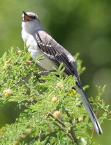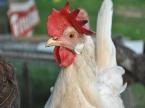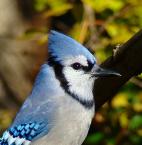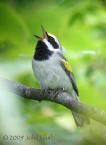Songs of Birds

Learning the songs of birds help to identify different species. Anyone interested in birds can learn to identify the songs and most of the call notes of common birds. It is interesting to note that only the male bird sings….with a few exceptions like the female grosbeak, who will sing under some conditions. Then there are some birds who are confused like a hen we have that “crows”…..

Most birds do most of their singing in the early morning and in the spring and summer months. They not only have a favorite time of day and a particular season of the year during which they do most of their singing, but they even have a certain perch or small defined territory from which they sing.
To learn to familiarize yourself with the different bird songs, you need to decide how you best can remember them. Such as, it has been said that the call of a blue jay can be best described as “repeated creakings of an old wheel barrow” Some bird watchers use particular words to remember bird songs such as “whip-por-will” or even “caw-caw”

Some ornithologists have have complicated systems of recording bird songs as musical scores. This method has its limitations because many variations of bird songs cannot be indicated by the characters used in writing music. The song of a bird, written as music, is not usually recognizable when played on a musical instrument.

Some things to note while watching a bird sing:
- Does the bird have more than one song?
- How does he act while singing?
- Does he make different movements with his head, such as throwing it back or to the side, while singing?
- Are you listening to a distress or warning call or maybe a mating song?

Observing bird songs and calls is just as listening to music….record what you hear and see in your Nature Study Journal .
Bird songs are territorial in that it communicates the identity and whereabouts of an individual to other birds and also signals sexual intentions. It is not to be confused with bird calls, which are used for alarms and contact, and are especially important in birds that feed or migrate in flocks. Almost all birds give calls of some sort, not all have a song…..
Although many songbirds have songs which are pleasant to the human ear, this is not always the case. Crows for example, make croaks or screeches which sound harsh to humans.
On an interesting note……
